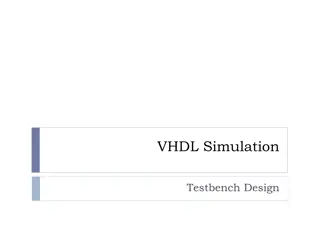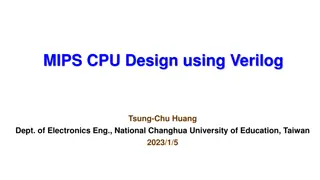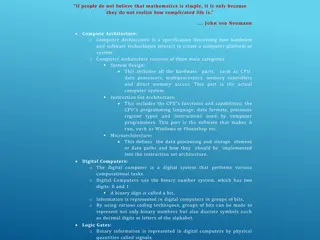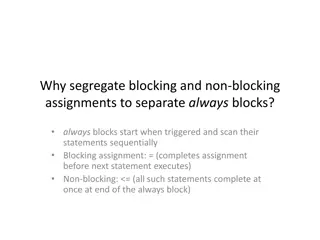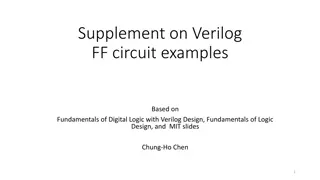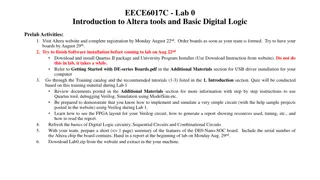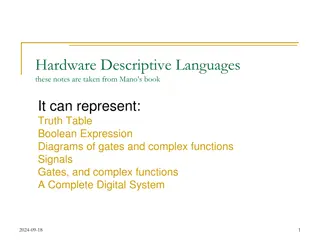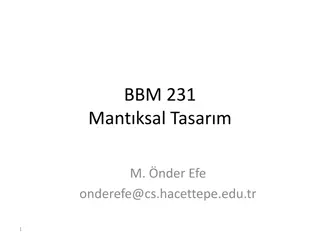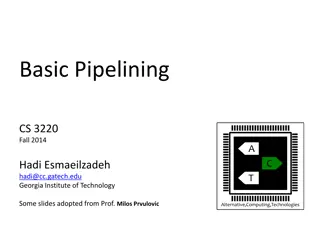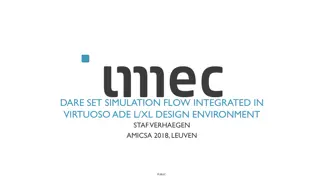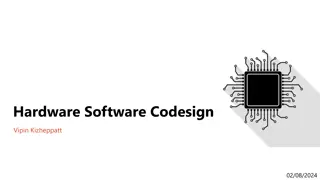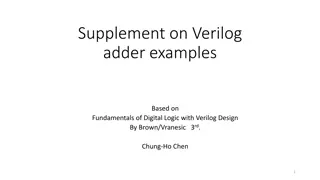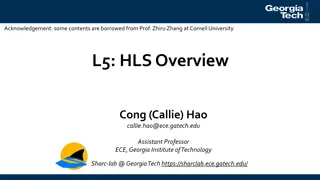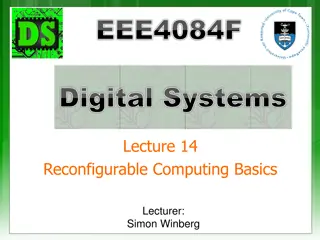Comprehensive VHDL Simulation Testbench Design Overview
In this detailed content, you will explore the concepts of VHDL simulation testbench design, project simulations in VHDL/Verilog, post-synthesis and post-layout processes, and example implementation of a modulo-7 counter VHDL model. The tutorial covers creating working libraries, mapping libraries,
1 views • 19 slides
MIPS CPU Design Using Verilog and Instruction Set Architecture Overview
Explore the world of MIPS CPU design using Verilog with a deep dive into Instruction Set Architecture (ISA), SPIM instruction formats, addressing modes, and more. Learn about the key components such as Program Counter (PC), Instruction Memory (IM), Register Files (RF), Arithmetic Logic Unit (ALU), D
1 views • 29 slides
Understanding Computer Architecture and Digital Circuits
Computer architecture encompasses system design, instruction set architecture, and microarchitecture, defining how hardware and software interact to create a computer platform. Digital computers operate using the binary number system and logic gates to process information. Hardware description langu
2 views • 8 slides
Understanding Blocking and Non-blocking Assignments in Verilog
Explore the intricacies of segregating blocking and non-blocking assignments to separate always blocks in Verilog. Learn about the differences between blocking and non-blocking assignments, their implications on sequential execution, and how to use them effectively in hardware description language p
0 views • 9 slides
Verilog FF Circuit Examples & Assignments Overview
Delve into Verilog FF circuit examples such as Gated D Latch and D Flip-Flop. Understand blocking and non-blocking assignments, their differences, and practical implications. Learn when to use each assignment method in Verilog design for combinational always blocks.
0 views • 17 slides
Development of Attosecond Theory for Nobel Prize through Verilog Programming
Attosecond generation is a crucial technique for creating attosecond pulses by manipulating radiation waves. This research paper focuses on developing the Attosecond generation equation through Verilog programming and validating it using test programming techniques. The interface between equations,
0 views • 15 slides
Altera Tools & Basic Digital Logic Lab Prep Activities
In preparation for the lab, tasks include registering on the Altera website, ordering required boards, installing software, familiarizing with DE0-Nano-SOC board, exploring digital logic concepts, and practicing Verilog circuits like half adder, full adder, D Flip Flop. The activities involve downlo
0 views • 13 slides
Understanding Hardware Descriptive Languages in Digital Systems
Hardware Descriptive Languages (HDLs) are used to represent various aspects of digital systems, including truth tables, Boolean expressions, gate diagrams, and complex functions. They find application in design entry, logic simulation, functional verification, circuit synthesis, timing verification,
0 views • 19 slides
Digital Electronic Circuit Design: BBM 231 Lecture Information
This content provides detailed information about the BBM 231 course covering topics such as lecture schedules, lab sections, grading criteria, lab assistants, contact information, motivation behind studying digital circuits, characteristics of digital systems, representation in electronics circuits,
0 views • 23 slides
Understanding Basic Pipelining in Computer Science
Exploring the concept of basic pipelining in computer science, focusing on a two-stage pipeline and key decisions involved in the process. The discussion covers pipeline stages, memory handling, control decisions, Verilog implementation, and keeping the design simple to understand and implement effe
0 views • 29 slides
Advanced Simulation Integration in Virtuoso Design Environment
Explore the seamless integration of simulation flows in the Virtuoso ADE L/XL design environment, showcased at AMICSA 2018 in Leuven. From DARE set simulations to Wish List features and historical advancements like SET Striker Verilog-A models, the presentation highlights the compatibility with ADE
0 views • 26 slides
Hardware-Software Codesign Course Details
This comprehensive hardware-software codesign course presented by Vipin Kizheppatt covers various aspects such as course management, objectives, prerequisites, evaluation components, software fundamentals, and practical applications. The course aims to equip participants with the skills to design an
0 views • 14 slides
Verilog Adder Examples & Typical IC Design Flow
This comprehensive content delves into Verilog adder examples, typical IC design flow, physical design considerations, and examples of OpenGL ES GPU and ARM hypervisor applications. It covers the fundamentals of digital logic with Verilog design, hardware description language, FPGA prototyping, phys
0 views • 27 slides
Understanding High-Level Synthesis (HLS) Process
High-Level Synthesis (HLS) is an automated design process that converts functional specifications into optimized hardware implementations at the Register-Transfer Level (RTL). It offers efficient hardware development using software specifications and program logic synthesis. HLS tools such as Verilo
0 views • 33 slides
Reconfigurable Computing Basics and Trends Overview
Reconfigurable Computing (RC) is gaining popularity as software processors face limitations in speed and parallelism. FPGAs offer a solution by implementing complex functions and enabling spatial computation. The course covers RC basics, Verilog introduction, and dual processing techniques for verif
0 views • 16 slides
